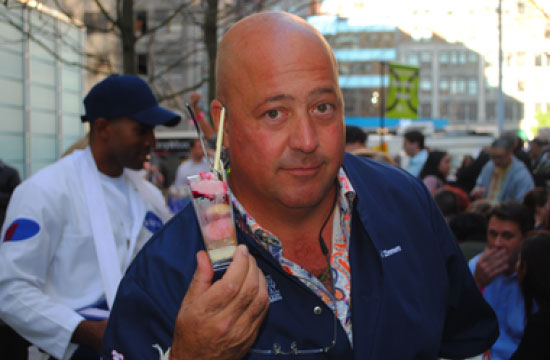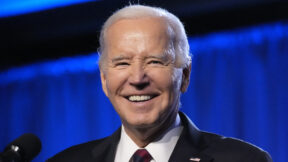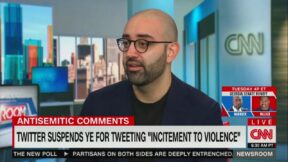Interview With Andrew Zimmern, Part Two: Bubblegum Chicken And The Spiritual Decline Of America
 You can find part one of our interview with Andrew Zimmern here, because it’s hard to fit his sentiments about American society into one post. Read that, take a breather — heck, find your nearest goat purveyor and make a tasty burger, and then come back to read about what he learned in his travels across America — as well as how pleased he is that he’s the reason kids eat their broccoli nowadays.
You can find part one of our interview with Andrew Zimmern here, because it’s hard to fit his sentiments about American society into one post. Read that, take a breather — heck, find your nearest goat purveyor and make a tasty burger, and then come back to read about what he learned in his travels across America — as well as how pleased he is that he’s the reason kids eat their broccoli nowadays.
You also have a kids’ book coming out soon, right?
We do. We just got copies of it two days ago. It drops October 30th. We can give you the link to it, but here’s the copy of it that I’ve been toting around. It’s really, really cool. Lots of charticles, lots of listicles, great information —
Lots of arrows, lots of explosions. It’s the perfect kids’ book!
I have an eight-year-old son. The book is dedicated to him. I run around the world and eat crazy things, right? And that’s one way to look at it. But I’m really trying to expand the idea of what food means to Americans, and to not be so judgemental about the lessons that are very easy for parents to teach, but are very hard for some kids to get. So if I can help in some way — like watching my TV show! When kids say “I don’t want to eat this broccoli on the table,” Mom and Dad can say, “Oh, Andrew Zimmern would eat that,” and then the kid eats it.
Has that actually happened?
Oh, all the time. I’m told that once a day by someone I bump into. I get a hug from a mom, and they say, “My kid eats fish because we dared him one night to eat it, and he liked it.” If I can, in some small way, introduce a whole generation of young readers to the idea of expanding your definition of food, then I will have done a good thing.
In your personal life, have you ever had to do that with your own son?
Oh, sure. All kids, they all get ideas. They sit and they talk in school, then he comes home and says, “Chicken tastes like bubblegum.” No it doesn’t, Noah, you’ve eaten chicken. But kids are that way. So you’re always fighting against the tide of popular culture. It reaches your kids in songs, cartoons, commericals, books — everywhere, they’re exposed to ideas. Children get messaging that’s not necessary correct. and so I’m glad I get to set the record straight.
But does your son ever rebel against you? “Yeah, Dad, but you’re the one who eats bugs!”
Yes, sometimes, but a lot of the time he thinks what I do for work is pretty cool. He likes to eat with me. My wife and I, at a very early age with him decided we would always take him out to restaurants and we wouldn’t feed him something different than we were feeding [ourselves]. We did the smart thing with our son and now he’s a really good eater and he’s very open-minded about food. He’ll try anything. He doesn’t like everything, but he’ll try anything. And a lot of stuff sticks. I’m very proud of him as an eater.
How did you meet [Go Fork Yourself! co-host] Molly Mogren?
Best story in the whole world! Molly sent me a resume and a picture of herself on a trans-Atlantic flight from Minnesota somewhere and she had a Post-It note on her face or shoulder that said, “Wake for food.” Literally, I turned to Dusti and I said, “Have this young lady come in.” And I knew right away and I basically hired her on the spot. So, she cold-called me. I tell young people all the time, ask for what you want. The worst thing that’s going to happen is [they] say “no.” Be creative, find a place you want to be, be overt, and I think that that story is the best example of it. I’m constantly charmed by it.
You recently wrapped up a season of Bizarre Foods in America.
We’re in the middle of shooting [another] one. The next round of twenty shows is February 11, 2013 — that’s when it starts, but we’re shooting now a season of Bizarre Foods in America now and after that, I hope to turn my attention to back out overseas.
You’ve always talked about how you learn a lot from your travels around the world. What have you learned about your travels in America?
Well, there’s two Americas. There’s an America that’s like the Vietnamese neighborhood in New Orleans that’s the largest in North America. I think it may be the largest population of Vietnamese outside the country of Vietnam. So, you go there and all you hear is Vietnamese spoken. You go into the markets, you might as well be in Vietnam. The Vietnamese have placed themselves in a neighborhood where all their houses can back onto the canals, they can all have gardens, and they’re raising ducks. Some of them are illegally shrimp farming and catfish farming. It’s an amazing thing. And the food is fantastic. Arguably better than it is in Vietnam. Simply because of the quality of the ingredients being so high and so varied.
The stories that come out of there are surprises for most of our viewers, but that still teach me the same lessons and are even more profound. Because here are ethnic groups that I visit with all over this country who are struggling to identify as Americans. And I can see in one building Grandma and Grandpa, born and raised in Vietnam, who came over here when the family had made enough money to send for them, Mom and Dad who came over in ’74/’75 with the great Vietnamese immigration, and then their kids ages ten to thirteen who are as American as my kids.
That is a very profound thing to study, how those people interact, how they behave around food with each other, and how much Americanization they’re willing to accept. Grandma and Grandpa — none, Mom and Dad — as much as is needed to stay relevant in the community and keep working, because they’re trying to honor their parents, and the kids couldn’t care less about what’s being served. They want to go over to their friends’ house and play XBox. Couldn’t be more Americanized, and in some cases don’t even want to eat the same food that Grandma and Grandpa are eating. So, those are the types of stories that we seek out.
And then there’s the traditionalist American stories that I think are worth preserving and are important for us to document. Whether it’s people living in the back woods of West Virginia or the hills of the Ozarks of Arkansas or in a hippies’ commune in the Willamic Valley. These are stories about Americans redefining themselves in the 21st century, and I think that as you look to see what parts of our history Americans choose to keep, I think that what’s fascinating is how much of our rootsy 19th century lifestyle people seem to be desperate to replicate. Just look at the “hunt it, cook it, eat it” phenomenon — that is a 19th century idea. It’s been around forever, but it’s not 20th century.
As a student of history, you go back to the post-World War I era in America, and people wanted to modernize, they wanted to mechanize, they wanted to be seen as being international. That’s when phrases like “redneck” became popular. “We don’t hunt for our food anymore. We’re beyond that. We have a housekeeper now.” Those were the types of things that were popular in America. Everyone wanted to be upwardly mobile. It seems now there’s a huge segment of the American culture that cherishes, worships, and is trying to deconstruct themselves to be downwardly mobile. They want to return to the things that were so popular in the 19th century. We still have big cities, we still have big corporations, a lot of things that aren’t going away in America, but I think people are realizing that some of our habits and practices from centuries past are valuable in terms of slowing down, in terms of honoring our environments, our history.
Look at how important new spiritual thinking is in America. One hundred and fifty years ago, everyone in America was churched. It didn’t matter whether you were Episcopalian, Catholic, or Jewish. Everybody had a practice and affiliation, went somewhere, worshiped. It was very community oriented. Agnosticism and religious laziness and everything in between really didn’t exist in large numbers to be significant. As recently as a generation ago, that was not the case — it was the exact opposite — and look at how many people now are actually talking about spirituality and spiritual belief systems. Not necessarily religion, but so many people that have an interest in redefining themselves in relationship to a power greater than themselves. The eternal question of human history is putting ourselves in relationship to the world and the greater spiritual world around us. I see that in America. Everywhere that I’m going, people are looking to define themselves in relationship to their community, in relationship to some czar of the heavens, in relationship to their family of ancestors’ culture. It’s a curiosity-driven time in this country.
A lot of people would categorize that as an upper-class phenomenon.
I don’t think so. I think that class divisions in this country have never been stronger. I think that one of the great problems of our generation is bridging the gap, of restoring the middle class. I think too many people are under-served in America and that’s criminal. Eating well in America is class-privileged. That’s a horrific situation. That’s a nightmare that needs to end. I meet people of all walks of life all over this country — rich and poor, young and old. Everybody today is thinking a little bit more about how to define themselves and their place in the world more so than 25 years ago. And I think for some people, it’s because they think that it’s a lifestyle choice. For others, it’s a survival mechanism. Foxhole Prayer: everyone believes in god when the bullets are flying and you think you’re in trouble. And I think there are a lot of people in this country who, sadly, because of circumstance, need our help and they are in trouble and they’re turning to all sorts of resources. I think that’s why you see this phenomenon across all classes.
You’ve largely shied away from cooking shows. Pretend that we lived under a horribly oppressive dystopian government, Hunger Games style, and they were to come and take away your food truck unless you compete in a cooking competition of your choice and you have to win. What show would you compete on and how would you win?
I love this question. I’ve said yes to every single cooking competition that’s ever called me and asked me to come on. The problem is that I’m away shooting a television show 30 weeks out of the year and so scheduling is a nightmare, because those shows shoot in small time frames. Iron Chef shoots over x number of weeks twice a year. So, the stars have to align. I actually do like doing that kind of thing. I’m a very competitive person. Also, most people know me as an eater. A lot of people have forgotten that I spent the first 20 years of my food career cooking in very high-end kitchens all over the world. So, I think I have a natural advantage there, the hidden secret component.
You’re like the little girl from The Hunger Games.
Exactly, right. I would want to go on something like Top Chef Masters or Next Iron Chef. I think they have the greatest collection of talented chef-testants and I wouldn’t want to go on Chopped and cook against a couple of line cooks. I may not win, I may not lose either, but I look at certain contestants on shows like that or Hell’s Kitchen, and it just wouldn’t be fair. You can’t throw someone who’s been cooking professionally for 30 years into an environment with people who haven’t. I’d want to go up and cook against my friends.
Which would also drive you to compete better?
Oh god, yeah. It’s like playing tennis. I always prefer to be the less talented tennis player on the court. I rise to the occasion. I always play better against someone else. Maybe someone will read that and invite me on a show.
Have a tip we should know? tips@mediaite.com






